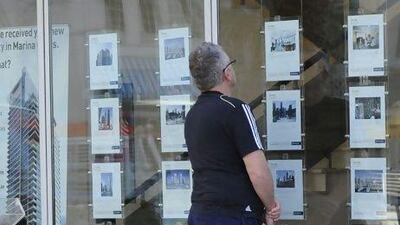The banking industry lobby group has called for a 75 per cent lending limit on first-time expat property purchases while off-plan mortgages should be limited to just half of the purchase price.
The recommendations from the Emirates Banks Association (EBA) represent what it believes to be the financial industry's consensus on how to apply curbs to property speculation.
The industry body says it is seeking a looser limit on mortgages than the Central Bank had initially suggested, but it has insisted on extra measures to limit lending to buyers of properties under construction.
The request by the EBA was submitted before a Central Bank circular taking the industry's views on a more appropriate loan-to-value limit for mortgage buyers.
The regulator was likely to settle somewhere in between its own preferred ratios and the banks' proposals rather than apply them completely, said analysts.
"It's in their interest to have as high a loan-to-value ratio as possible," said Shabbir Malik, a financial analyst at EFG Hermes. "The Central Bank would try to bring that down as much as possible."
The industry lobby group is seeking a 75 per cent loan-to-value limit for expatriates taking out their first mortgage, compared to an 80 per cent limit for UAE nationals.
Buyers of off-plan properties were among the biggest victims of Dubai's property crash, with large numbers of projects stalled as a result of the global financial crisis.
With the Dubai property market recovering substantially over the past year, the Central Bank last month distributed a circular capping the amount that expatriate first-time buyers could borrow to a maximum of 50 per cent of a property's value, while those buying subsequent properties could finance only 40 per cent of its value.
UAE nationals were given a looser limit of 70 per cent, lowered to 60 per cent for second homes and further investment properties.
Property agents have said that the effect has been to sap demand for new properties, while banks have warned that the cap in its current form would cut off the Emirates' economic recovery.
The Central Bank said last week that the circular was intended only as the beginning of a consultation with lenders, adding that it would solicit views from the industry.
Banks have until Thursday to submit their comments.
Across the sector, mortgages increased by just 0.1 per cent to Dh161.7 billion (US$44.02bn) during the first nine months of last year, according to the most recent available data from the Central Bank.
Property speculation could be difficult to rein in even if the Central Bank does limit mortgage lending, given the large number of cash buyers in the market, said Matthew Green, the head of research and consultancy at CBRE.
"We see a lot of cash in this market. That's probably one of the fundamental drivers of the price growth we've seen over the past 12-18 months," he said.
However, the market for properties under construction was now substantially smaller than prior to the financial crisis, with only a handful of projects launched during the past year being financed off-plan, added Mr Green.
"It's a tighter market compared to where we were in 2007 or 2008," he said. "It's only really the established developers [such as Emaar] going down this route."

